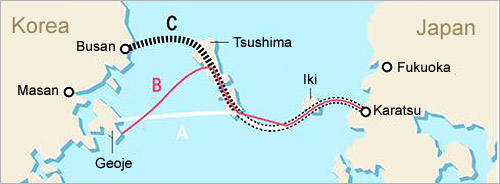Sometimes you come across an idea that is so mad that it might just have a chance of success. This was the case when I first heard about proposals to dig a 200km+ undersea train tunnel between Korea and Japan in a similar fashion to the Channel Tunnel which connects Britain and France (albeit 4 times longer). The tunnel has a number of proposed routes, a couple of which would see it also pass through the territorially disputed islands of Tsushima and Iki on its path.

It’s estimated that it would cost around 100 trillion Won (£1=W2000) and 15 to 20 years to build the so-called “peace tunnel” which would be a joint venture between the two countries if it ever comes to fruition. The technical, economic and political feasibility of the project is currently being estimated but it is still far from clear whether it will ever get the go ahead given the uncertainties.
Aside from improving relations between the two countries and promoting economic growth what excites me about this project is the wider implications for trans-continental travel around the world. With the cost of flying rising every year and the environmental impacts ever more present could high-speed rail links, taking advantage of new connections such as this, be part of the solution?
If the tunnel is ever built it would be physically feasible to travel by train all the way from London to Tokyo without the need for flying (ignoring the small problem of North Korea for the moment!) and combined with new technology in the future such as magnetic levitation the journey time wouldn’t necessarily be a huge amount longer than flying.
In the wake of the devastating earthquake in China yesterday you have to wonder whether building a massive underwater tunnel in an area of tectonic instability is a good idea but as pipe dreams go (excuse the pun) I’m all in favour! Humankind has always strived to push the boundaries of science, technology and engineering and it can’t be a bad thing if this helps bring together two historically hostile neighbours.

Reply